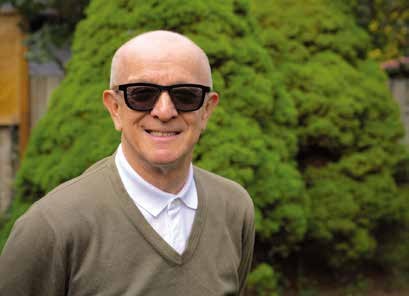Mental Health Is Mental Wealth
By André Morriseau

Several months ago, I had chosen to write my next column on the timely issue of mental health. This past September marked 40 years since my older brother Dale sadly took his own life, breaking our family’s heart. I continue to relive the moment I got the call from my mother over and over again, followed by days, weeks, months and years of searching for deeper personal understanding. His passing at the young age of 26 created a colliding of worlds, leaving countless questions in an endless future wake.
Today, mental health is echoing with memories of our shared experiences of COVID-19. New challenges have opened us all to an awareness of an issue that has always been there. Only now with connectivity are we speaking more openly about the world just below the surface of our daily existence. Reality can bite!
As a gay man who really discovered his world of thought (gayness) in the 1970s, I grew up with the challenges of not knowing who I really was. Back then, mental health had dark, stigmatized connotations. A guidance counsellor in school was more for what you wanted to be when you grow up – aquestion that continues to present a multitude of angles at any age in life.
Instrumental in my journey as a gay man was my introduction to Dunlop Health Centres International and Dr. Alicia Dunlop, a psychologist who has specialized in delivering services to First Nations communities across Canada for over 29 years. She has developed and implemented the Life Long Personal Positive Strengths model of counselling to counter the effects of Residential School experiences across generations. Her fundamental belief is that mental health is mental wealth, which has woven strength into my outlook on life.
COVID-19 and the great digital leap forward it created opened the door to creative new services providing mental health options. Pride Counselling offers professional therapy for the LGBTQ+ community. You have many options for how you choose to communicate with your therapist. You can send audio, video or text messages to your therapist at any time in the messaging room. You can also schedule weekly live sessions (from 30 to 45 min) with your therapist to communicate via phone, video or live chat.
If you don’t like your assigned therapist for whatever reason, you can ask to be matched to a different one. Pride Counseling has over 9,000 therapists with different qualifications and areas of expertise. Our online world, although not tactile, has really opened the door to allow us to take a more personal and active approach to the help we are seeking.
The business world coming out of COVID-19 has affected employees and business’s ability to attract and retain staff. Everyone on some level – gay or straight – has been challenged to see work through a more enlightened lens, searching for healthier mental health interpretations of the way we work and of our relationships with employers, co-workers and the environment around us.
More conventional mental health services may include people like Jen Horak (they/them), a registered psychotherapist with a private practice in Tkaronto (Toronto) focusing on relational and sensorimotor therapy modalities. They are a queer, non-binary, white, able-bodied person with Danish and Czech ancestry.
“ Learning to live with ourselves, our frailties and our fears is an important medicine on the road to positive mental health. ”
-ANDRÉ MORRISEAU
“We cannot underestimate the importance of regular mental health care,” Jen kindly shared with me. “The health of our brain impacts our nervous system, our immune system, the diet and substance choices we make, and determines what our daily life feels like. It is absolutely critical to understand that our mental health is our physical health, and to take it just as seriously.”
The 519 is Canada’s most prominent 2SLGBTQ+ community centre, located in Toronto’s Church and Wellesley neighbourhood. Since 1975, they have been responding to the most urgent and emerging needs of 2SLGBTQ+ communities in Toronto and beyond.
The COVID-19 pandemic provided The 519 the opportunity to pivot their services into an essential services model, responding to the needs of people in the neighbourhood and their communities. One such service included mental health and check-in services owing to the great deal of isolation their communities experienced.
Mental health is health, and that is something The 519 is cognizant of and committed to addressing across their programs, including food security programs and drop-ins.
My closing thought I want to share is that when I was eight years old, while my father attended Ranger School in Dorset, Ont. with my mother and little sister in tow, my brothers and I attended Residential School for six months. At that young age, I experienced firsthand the interior of the machinery that would destroy generations of Indigenous childhoods and cause the resounding intergenerational trauma that continues to this day. It was here that I learned to embrace a lifelong empathy for others. Learning to live with ourselves, our frailties and our fears is an important medicine on the road to positive mental health. Having access to services and trained professionals is key on the path to feeling optimistic and hopeful about the world around us, our shared life experiences and our personal world within.